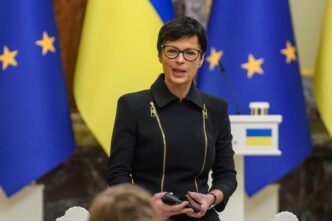Executive Summary
- The European Commission’s annual enlargement report reveals mixed progress among the ten official EU candidate countries, with some advancing significantly and others stagnating or experiencing democratic backsliding.
- Albania, Montenegro, Moldova, and Ukraine have demonstrated substantial progress in essential reforms and have set ambitious targets for concluding their accession negotiations.
- Conversely, several Western Balkan nations (North Macedonia, Bosnia and Herzegovina, Kosovo, Serbia) and Turkey have shown limited advancement or democratic backsliding, while Georgia has paused its EU accession process until 2028.
The Story So Far
- The EU accession process is a highly politicized and technical endeavor requiring unanimous backing from all member states and significant reforms in areas like rule of law, democracy, and fundamental rights. While the geopolitical context following Russia’s invasion of Ukraine has created a political imperative to fast-track candidates like Ukraine and Moldova, the overall picture among the ten official candidate countries is mixed, with some showing strong progress and others experiencing stagnation or democratic backsliding, leading to calls for the EU to adopt a tougher, merit-based stance.
Why This Matters
- The European Commission’s latest enlargement report signals a potential multi-speed future for EU expansion, where politically prioritized candidates like Ukraine and Moldova may advance despite potential member state vetoes, while countries showing democratic backsliding, such as Serbia and Turkey, face stalled bids and potential punitive measures like sanctions or suspended financial support. This underscores the complex and highly politicized nature of the accession process, where progress is not uniform and compliance with rule of law and democratic reforms remains paramount for successful integration.
Who Thinks What?
- The European Commission, through its annual enlargement report and Commissioner Marta Kos, acknowledges significant progress in essential reforms by Albania, Montenegro, Moldova, and Ukraine, while noting limited advancement or democratic backsliding in several Western Balkan nations and Turkey, emphasizing that “ambitions are more important than years or dates” for candidate countries.
- Tinatin Akhvlediani, a research fellow at the Centre for European Policy Studies (CEPS), views the parallel assessment of Moldova and Ukraine’s progress as a deliberate political imperative to avoid a setback for Kyiv and suggests the EU could adopt a tougher stance, including sanctions or suspending financial support, against countries like Serbia due to democratic backsliding.
- Despite political will to fast-track the accession paths for Ukraine and Moldova, member states like Hungary pose potential vetoes concerning Ukraine, and France and Germany call for a more cautious pace, indicating that unanimous backing from all member states remains a significant political hurdle.
The European Commission’s annual enlargement report, released on Tuesday, reveals a mixed picture of progress among the ten official EU candidate countries. While Albania, Montenegro, Moldova, and Ukraine have demonstrated significant strides in essential reforms, several Western Balkan nations and Turkey have shown limited advancement or even democratic backsliding. The report underscores the highly politicised and technical nature of the EU accession process, which requires unanimous backing from all member states at every major step.
Progress in the Western Balkans and Eastern Europe
Montenegro continues to be the most advanced candidate, with Albania closely following due to substantial progress in judicial reform. Both nations have set ambitious targets, pledging to conclude their accession negotiations by 2026 and 2027, respectively, signaling a renewed commitment to the reform agenda.
Moldova and Ukraine also received praise for their advancement on key reforms, with both countries aiming to finalize negotiations by 2028. The Commission’s report used nearly identical language when assessing their progress, a deliberate choice reflecting their parallel paths towards accession, according to Tinatin Akhvlediani, a research fellow at the Centre for European Policy Studies (CEPS).
This parallel approach is seen as a political imperative to avoid a setback for Kyiv, especially given that both countries applied for membership following Russia’s full-scale invasion of Ukraine. However, despite this political will to fast-track their paths, potential vetoes from member states, particularly Hungary concerning Ukraine, and calls for a more cautious pace from France and Germany, could still impede progress.
Enlargement Commissioner Marta Kos emphasized that “ambitions are more important than years or dates” for candidate countries. The reforms deemed vital by Brussels span critical areas such as the rule of law, democracy, fundamental rights, public administration, and economic stability.
Stagnation and Backsliding
In contrast, several other candidate countries have struggled to maintain momentum on reforms. North Macedonia showed no improvement in judiciary or fundamental rights, while Bosnia and Herzegovina lagged in areas like freedom of expression and the fight against corruption. Kosovo made no progress on the free movement of goods or integrating gender equality and evidence-based policymaking.
Turkey’s EU bid has been stalled since 2018 amid ongoing concerns over democratic backsliding and rule of law. Georgia’s accession process effectively halted in 2024, with Tbilisi deciding to put its EU ambitions on hold until 2028, following a shift away from Western alliances.
Serbia, currently marred by protests, is also failing to deliver on its reform commitments. Commissioner Kos noted that the “actual pace of implementation of reforms has slowed down significantly,” urging Serbia to deliver credible reforms across the board, particularly in fundamental areas. During a recent visit to Belgrade, Commission President Ursula von der Leyen called on Serbian President Aleksandar Vučić to reaffirm his country’s commitment to EU membership, highlighting the need for progress on the rule of law, electoral framework, and media freedom.
Expert Outlook
According to CEPS research fellow Tinatin Akhvlediani, given Serbia’s deepening democratic backsliding, the EU could justifiably adopt a tougher stance. This might include applying negative conditionality, sanctions, or even suspending financial support, aligning with the EU’s merit-based approach to enlargement.
The European Commission’s latest enlargement report underscores the complex and varied journeys of candidate countries towards EU membership. While some demonstrate clear commitment and progress, others face significant challenges in upholding democratic principles and implementing essential reforms, reflecting the ongoing political and technical hurdles inherent in the enlargement process.








